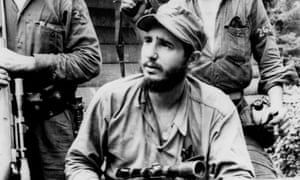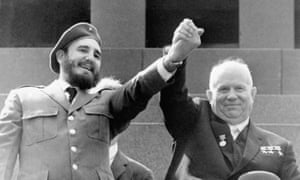"The Guardian" es uno de los periódicos de más influencia en el Reino Unido. Los británicos lo consideran un medio de excelencia. Ese periódico publicó un obituario a Fidel Castro, líder de la revolución cubana, que todos debiéramos leer.
El mismo nos dice que Fidel fue una de las figuras políticas más extraordinarias del siglo XX, quien después de liderar una revolución exitosa en una isla caribeña en 1959, Cuba, se convirtió en un importante protagonista en el escenario mundial.
El autor de la nota Richard Gott, es un periodista e historiador británico de gran renombre. Fue corresponsal para América Latina y editor del periódico británico.
Cuando Fidel todavía vivía muchos agentes del imperio se arañaban la cara para fustigar al líder cubano. Algunos en actos que reflejaban ignorancia sobre el tema celebraron hasta su muerte.
Hoy los miserables callan y buscan hacer lo propio con otros líderes de Nuestra América.
Pero la historia queda y, como diría Fidel, los absuelve. Mientras a Fidel, Chávez, Torrijos, Velasco, etc., los recordamos siempre, los otros yacen olvidados en el tacho de la historia.
Para los estudiosos les recomiendo leer el siguiente obituario que desde una óptica británica nos hace conocer la grandeza de Fidel y la justicia de su causa que es la misma causa de todos los revolucionarios que luchan en nuestro explotado y saqueado continente.
Jorge Aliaga Cacho
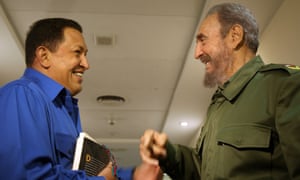 |
| FacebookTwitterPinterest Castro with Venezuelan president Hugo Chavez. Photograph: REX/Shutterstock |
By Richard Gott
First published on Sat 26 Nov ‘16 12.12 GMT
Fidel Castro, who has died at the age of 90, was one of the more extraordinary political figures of the 20th century. After leading a successful revolution on a Caribbean island in 1959, he became a player on the global stage, dealing on equal terms with successive leaders of the two nuclear superpowers during the cold war. A charismatic figure from the developing world, his influence was felt far beyond the shores of Cuba. Known as Fidel to friends and enemies alike, his life story is inevitably that of his people and their revolution. Even in old age, he still exercised a magnetic attraction wherever he went, his audience as fascinated by the dinosaur from history as they had once been by the revolutionary firebrand of earlier times.
The Russians were beguiled by him (Nikita Khrushchev and Anastas Mikoyan in particular), European intellectuals took him to their hearts (notably Jean-Paul Sartre and Simone de Beauvoir), African revolutionaries welcomed his assistance and advice, and the leaders of Latin American peasant movements were inspired by his revolution. In the 21st century, he acquired fresh relevance as the mentor of Hugo Chávez in Venezuela and Evo Morales in Bolivia, the leaders of two unusual revolutions that threatened the hegemony of the US. Only the US itself, which viewed Castro as public enemy No 1 (until they found an “axis of evil” further afield), and the Chinese in the Mao era, who found his political behaviour essentially irresponsible, refused to fall for his charm. It took until Barack Obama’s presidency for US restrictions to be eased – but by then intestinal illness had compelled Castro’s resignation as president in favour of his brother Raúl, who saw in the historic normalising of relations between the two countries. Nonetheless, Fidel maintained his antagonism until the end, declaring in a letter on his 90th birthday this year that “we don’t need the empire to give us anything”.
Castro’s rule thus spanned nearly five decades, and during the cold war hardly a year went by without his mark being made on international politics. On several occasions the world held its breath as events in and around Cuba threatened to spill beyond the Caribbean. In 1961 an invasion at the Bay of Pigs by Cuban exiles, encouraged and financed by the US government, sought to bring down Castro’s revolution. It was swiftly defeated. In 1962 Khrushchev’s government installed nuclear missiles in Cuba in an attempt to provide the infant revolution with “protection” of the only kind the US seemed prepared to respect. And in November 1975 a massive and wholly unexpected airlift of Cuban troops to Africa turned the tide of a South African invasion of newly independent Angola, inevitably heating up cold war quarrels.
FacebookTwitterPinterest The young anti-Batista guerrilla leader Fidel Castro. Photograph: Andrew St. George/AP
Castro was a hero in the mould of Garibaldi, a national leader whose ideals and rhetoric were to change the history of countries far from his own. Latin America, ruled for the most part in the 1950s by oligarchies inherited from the colonial era, of landowners, soldiers and Catholic priests, was suddenly brought into the global limelight, its governments challenged by the revolutionary gauntlet thrown down by the island republic. Whether in favour or against, an entire Latin American generation was influenced by Castro.
Cuba under Fidel was a country where indigenous nationalism was at least as significant as imported socialism, and where the legend of José Martí, the patriot poet and organiser of the 19th-century struggle against Spain, was always more influential than the philosophy of Karl Marx. Castro’s skill, and one key to his political longevity, lay in keeping the twin themes of socialism and nationalism endlessly in play. He gave the Cuban people back their history, the name of their island stamped firmly on the story of the 20th century. This was no mean achievement, though by the early 1990s, when the collapse of the Soviet Union brought the Cuban economy down with a bump, the old rhetoric had begun to wear thin.
Fidel was the son of Lina Ruz, a Cuban woman from Pinar del Río, and Angel Castro, an immigrant from Spanish Galicia who became a successful landowner in central Cuba. Educated by the Jesuits, and subsequently as a lawyer at Havana University, he was clearly marked for politics from early youth. A brilliant student orator and a successful athlete, he was the outstanding figure of his generation of students.
The return to power by coup d’etat in 1952 of the old dictator, Fulgencio Batista, seemed to rule out the traditional road to political power for the young lawyer, and an impatient Castro embraced the cause of insurrection, common in those years in the unstable countries that bordered the Caribbean. On 26 July 1953, he led a group of revolutionaries who sought to overthrow the dictator by seizing the second largest military base in the country, the Moncada barracks in Santiago de Cuba.
The attack was a dismal failure, and many of the erstwhile rebels were captured and killed. Castro himself survived, to make a notable speech from the dock – “history will absolve me” – outlining his political programme. It became the classic text of the 26th of July Movement that he was later to organise, using the failed Moncada attack as a rallying cry to unite the anti-Batista opposition into a single political force.
Granted an amnesty two years later, Castro was exiled to Mexico. With his brother Raúl, he prepared a group of armed fighters to assist the civilian resistance movement. Soon he had met and enrolled in his band an Argentinian doctor, Che Guevara, whose name was to be irrevocably linked to the revolution. Castro’s tiny force sailed from Mexico to Cuba in December 1956 in the Granma, a small and leaky motor vessel. Landing in the east of the island after a rough crossing, the rebel band was attacked and almost annihilated by Batista’s forces. A few members of Castro’s troop survived to struggle up the impenetrable mountains of the Sierra Maestra. There they tended their wounds, regained their strength, made contact with the local peasants, and established links with the opposition in the city of Santiago.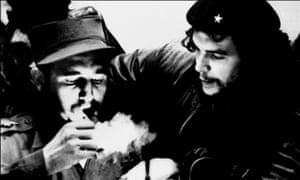

FacebookTwitterPinterest Fidel Castro (L) with Ernesto Che Guevara. Photograph: Roberto Salas/AFP/Getty Images
Throughout 1957 and 1958, Castro’s guerrilla band grew in strength and daring. They had no blueprint. Their first aim had been to survive. Only later did revolutionary theorists develop the notion that the very existence of an armed struggle in rural areas might help to define the course of civilian politics, putting the dictatorship on to the defensive, and forcing squabbling opposition groups to unite behind the guerrilla banner. Yet that is what took place in Cuba. Civilian parties and opposition movements were forced to accept orders from the guerrillas in the hills, and even the conservative and unadventurous Communist party of Cuba eventually came to bow the knee to Castro in the summer of 1958. By December that year, Guevara had captured the central city of Santa Clara, and on New Year’s Eve, Batista fled the country. In January 1959, Castro, aged 30, arrived in triumph in Havana. The Cuban revolution had begun.
His early programme was one of radical reform, comparable to that espoused by populist governments in Latin America over the previous 30 years. The expropriation of large estates, the nationalisation of foreign enterprises and the establishment of schools and clinics throughout the island were the initial demands of his movement.
Like most Latin American leftwingers at that time, Castro was influenced by Marxism – whatever that might mean in the Latin American context, about which Marx himself had little to say. In practice it meant a warm feeling for the (far away) Russian revolution, and a strong dislike of (nearby) Yankee “imperialism”. Radicals were familiar with the historical tendency of the US to interfere in Latin America in general and Cuba in particular – economically all the time and militarily at all too frequent intervals. This leftist inclination did not usually involve much enthusiasm for the local Communist party which, in Cuba as elsewhere in Latin America (except in Chile), had always been small and lacking influence. Castro himself was not a communist, though his brother had strong sympathies, as did Guevara.
Castro’s anti-American rhetoric and nationalisation of US companies soon aroused American anger. The bungled Bay of Pigs invasion, in the early months of John F Kennedy’s presidency, postponed any possible improvement in relations. US dislike of Castro was reinforced by the presence of an immense diaspora of the Cuban middle class, based chiefly in Miami, who had left in a hurry and expected at any moment to return in triumph. It was not to be.
The missile crisis of October 1962 sealed the hostility. Khrushchev’s move into Cuba – introducing nuclear weapons (other than US ones) into an area of the world where the Monroe doctrine was held to prevail – was widely regarded as destabilising, although the Soviet Union itself had US nuclear missiles on its borders, notably in Turkey. Khrushchev was forced to withdraw his missiles after days of global tension, although not before he had received a tacit promise from the Americans that there would be no further attempts to invade Cuba.
Castro’s performance during the crisis was less than heroic. The fate of his revolution was decided elsewhere. The compromise on the missiles reached between Washington and Moscow enabled his regime to survive, but the ignominious manner of its happening was to fuel Castro’s fierce sense of independence. His only success in the affair was his absolute refusal to permit US inspection of the evacuated missile sites.
FacebookTwitterPinterest Fidel Castro with Nikita Khrushchev in Moscow in 1963. Photograph: AP
Whether Castro was pushed into the Soviet camp by US mishandling in the early years, or whether that was where he planned to be all along, is a matter of historical debate. There is evidence on both sides, and Castro allowed different interpretations to flourish. Guevara and Raúl Castro were certainly persuaded of the need to make an alliance with the Cuban communists, the only party that had troubled to enrol the country’s black people, and they had great hopes of economic (and later military) support from the Soviet Union. Yet for the first 10 years of Castro’s regime – until 1968 when he supported the invasion of Czechoslovakia by Leonid Brezhnev – he fought hard to maintain Cuba’s separate identity as a developing country struggling to take its own particular road to socialism. Even when he had taken the Soviet shilling, he tried ceaselessly to build bridges elsewhere – in Latin America (to Peru, Panama and Chile); in Africa (to Algeria, Angola and Ethiopia); and in Asia (to Vietnam – Vietnam Heróico as the Cubans liked to call it – and North Korea).
Although Kennedy had given a tacit promise to Khrushchev that invasion would never be repeated, the Americans continued to permit CIA-sponsored attacks on the island and refused to lift their economic blockade, pressurising the countries of Latin America to join in. Castro was effectively deprived of all contact with the US mainland, and later with most of Latin America. At first it was just fresh vegetables that Cubans could no longer obtain from Miami. Soon they were forced to abandon hope of receiving machinery and technology from the capitalist world. The oil blockade was particularly damaging. While the Soviet Union came to the rescue when oil could no longer be obtained from Venezuela or the Gulf of Mexico, the long journey from the Black Sea was hardly ideal. Their ships could carry no returning trade.
For a Caribbean island, rooted historically and geographically in the sea between the US and Venezuela, it was a cruel blow to lose the taproot of its commerce. Cuba had had previous experience of a monopolistic trade relationship, with Spain, its far-off madre patria, but the Soviet Union was even further away, and had little in common with Cuba except political rhetoric. The close Soviet link was to have a serious disadvantage in that it gave Cuba little opportunity to experiment economically. Guevara had hoped in the early days that the island might escape from the tyranny of sugar production and diversify its economy, but Castro perceived this to be an empty dream. Sugar was the only significant product Cuba could exchange for Soviet oil.
Perhaps Castro should never have made the effort to go it alone. Some thought the price was too high. The US was, and is, immensely powerful – and very close. The Dominican Republic of Juan Bosch was unable to escape US pressure in 1965, nor could Salvador Allende’s Chile in 1973. The baleful experience of Nicaragua, 30 years after the Cuban revolution, showed that the passage of time had not made the task of securing sovereignty any easier for a small Latin American state. Yet Castro’s largely successful attempt to escape from the geographic fatalism that had affected Latin America for so long should not go uncelebrated.
Isolated from Latin America in the 1960s by the US blockade, Castro made efforts to assist revolutionaries who sought to turn the Andes into a new Sierra Maestra. The impact was considerable, yet brought Cuba little political reward. No revolutionary group was able to repeat the example of Cuba in the early years, and even when Guevara himself joined the fray in Bolivia in 1966, his expedition was to end in disaster a year later.
After 10 years in power, safely basking in Soviet approval, Castro’s policy towards Latin America became more circumspect. When Allende, a friendly socialist, won the presidential elections in Chile in 1970, Castro counselled caution. The victorious Sandinistas of Nicaragua received the same message in 1979. Castro knew from experience that building socialism in one small, developing country was not an easy option. Guevara had once called for the creation of “one, two, three, many Vietnams”, but who was going to fund and sustain them? The large Soviet economic support for Cuba was never going to be matched in Chile or Nicaragua.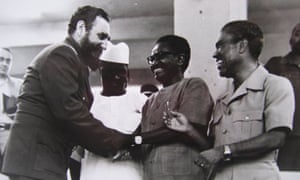

FacebookTwitterPinterest Fidel Castro greets three African presidents - Sekou Tour,Agostinho Neto and Luis Cabral. Photograph: BBC
Castro’s Cuba was an early member of the Non-Aligned Movement, the first attempt to mobilise the emerging developing countries for a political purpose. Soon, leaders of African revolutionary movements were honoured guests in Havana – notably Ben Bella and Houari Boumédiènne from Algeria, and Agostinho Neto from Angola, in full rebellion against the Portuguese. Guevara, by touring Africa in the early 1960s and then going to fight with guerrillas organised in the eastern Congo by Laurent Kabila, later president of the Democratic Republic of the Congo, also helped to bring Africa into focus in Havana.
There was a further dimension. For Castro, Cuba was not just a Caribbean country with Hispanic connections. He was the first white Cuban leader to recognise the country’s large black, former slave population and, after initial hesitation, to make efforts to bring them into the mainstream of national life. Sergeant Batista, his predecessor, banned from Havana’s top clubs because of his mixed race, had secured considerable support from black people in the Cuban army, and Castro took up their cause. His championing of them came at the same time as the civil rights movement was growing in the US, and this may have contributed to the nervousness of the US government over his regime. On an early visit to the UN in New York, Castro stayed at the Hotel Theresa in Harlem, a symbolic but significant gesture.
Recovering Cuba’s black roots, both in the African slave trade and in the independence struggle of the 19th century, was a natural prelude to taking an interest in an Africa still in the throes of decolonisation. Cuban troops played a historic role in 1975 in rescuing Neto’s embryonic MPLA government in Angola from the South African army. Castro displayed a personal interest in the Angolan expedition, as he did two years later in Ethiopia, when Cuban soldiers were sent to assist the regime of Mengistu Haile Mariam. The Cubans helped the Ethiopians to push back the Somalis from the Ogaden. Castro’s boldness in flinging men and resources into foreign wars when Cuba itself was under permanent threat of attack was typical of his style.
The policies of glasnost and perestroika espoused by Mikhail Gorbachev in the 1980s brought a dramatic unravelling of the Cuban revolution. Castro was always an opportunist communist rather than a true believer such as Erich Honecker, the East German leader, yet the two men shared a distrust of Gorbachev’s reforms. The stability and survival of their states depended on Russian support, although Cuba, the fruit of a popular revolution, had greater staying power than East Germany. Unlike some in the Cuban political elite who appeared willing to embrace changes in the Soviet system, Castro recognised that they would lead to disaster. For Cuba, the writing was on the wall even before the collapse of the Soviet Union after the failed coup against Gorbachev in August 1991. Castro knew that the US had made clear to the Russians, in 1990, that future economic assistance to the Soviet Union would depend on an end to Soviet aid to Cuba.
Castro declared a state of emergency, of the kind that would have been imposed had there been a military invasion. His political genius was for improvisation and compromise, coupled with a verbal felicity that proved capable of persuading people that he was doing one thing when actually doing another. He now projected Cuba as the world’s first truly “green” society, with industry powered by windmills, and the people riding bicycles. It was guerrilla war all over again, with Castro invoking the spirit of the Sierra Maestra.
Then, before any significant change could be made to the Cuban system, the Soviet Union imploded, and with it went the extensive economic network that it had maintained. A form of perestroika had now to be forced on the Cubans whether they wanted it or not, for Castro’s ally had simply melted away. Boris Yeltsin, the new Russian leader, was no friend. He had even visited Jorge Mas Canosa, the principal organiser of the Cuban exiles in Miami, and he soon removed Russian soldiers from the island and abandoned most of the preferential economic agreements that had kept the Cuban economy afloat for so long. Hopes in the US that Cuba would go the way of the countries of eastern Europe were encouraged by legislation in Congress that sought to tighten the economic embargo.
Almost miraculously, Castro survived this period, throwing open the country to foreign tourists and permitting a dual economy in which the US dollar reigned supreme. In January 1998, his efforts to secure fresh international recognition were crowned by a visit from Pope John Paul II, seen by some as the author of the overthrow of communism in eastern Europe. Castro’s communism had always been tempered by respect for the Catholic church, and he had long taken an interest in liberation theology and in the convergence on the ground in Latin America – notably in the period of military dictatorships in the 1970s – between Catholic priests and leftwing human rights activists. Yet the pope was an outspoken opponent of that trend in his church, and his visit thus seemed all the more unusual and surprising. If John Paul had hoped that his visit would help to undermine Castro’s regime, he was to be disappointed.
Early in this century, Castro’s star was once again in the ascendant, with a marked improvement in the economic situation and the presence in Latin America of a powerful and wealthy new acolyte. Hugo Chávez of Venezuela, first elected in December 1998, was soon to identify himself as Castro’s favourite son. Enjoying huge oil royalties, Chávez was able to finance mutual aid that brought thousands of Cuban doctors to work in the shanty towns of Venezuela, and hundreds of thousands of gallons of oil to the thirsty refineries of Cuba. The impact on the economy was immediate.
Castro was a legend long before his death. The early years of revolutionary government, with dashing young men in guerrilla fatigues sporting the then unfashionable beards grown in the revolutionary war, were romantic, chaotic and exhausting. Castro worked at all hours of day and night (mostly night), made long and didactic speeches, and was rarely out of his 4x4, ceaselessly travelling from one end of the country to another.
Over the years, he calmed down, became more measured, spoke as often but not for so long. His government became less of a one-man band, and power was sufficiently decentralised to allow him to travel abroad for months at a time. The Americans could never forgive him, but he became a welcome visitor all over the developing world, and notably, in the 1980s and 1990s, in Latin America. Although too long-winded for European tastes, the best of his full-scale speeches were models of wit and clarity, well-prepared and delivered with the panache of a trained orator.
A handful of women found space in Castro’s life, but he always claimed he was married to the revolution. He had married a fellow student, Mirta Díaz-Balart, in 1948, and they had a son, Fidelito, but she divorced him a few years later and went to live in the US. An early lover was Naty Revuelta, with whom he had a daughter, Alina, and he was always close to Célia Sánchez, the compañera he met in the mountains in 1956. She died in 1980. In that year, he took a new wife, Dalia Soto del Valle, a teacher from the town of Trinidad, who was rarely seen in public. They had five boys – Angel, Antonio, Alejandro, Alexis and Alex – named allegedly after his various noms de guerre in the Sierra Maestra. Outside these relationships he had a son, Jorge Angel, and a daughter, Francisca.
Castro’s revolution was a remarkably peaceful process, apart from a number of Batista’s henchmen shot in the first weeks. Some revolutionary enthusiasts of the first generation could not stomach the government’s leftward drift, and swaths of the professional middle class left for Miami, but the revolution did not “eat its children”. Much of the inner group around Castro survived into old age.
FacebookTwitterPinterest Castro falls badly after a speech in Santa Clara in 2004. Photograph: AP
Tensions arose occasionally with the old communists and the island’s intellectuals (who suffered as much from blockade-induced isolation as from outright censorship), and in 1989 a couple of senior generals were executed for drug-running. Critics liked to argue that “General” Castro was no different in essence from any other Latin America dictator, yet such criticism was hard to sustain. He more closely resembled the Spanish colonial governor-generals, many of whom were benign autocrats, than the sanguinary military leaders of the 20th century. Even when his regime was under attack, he retained immense popular support. His huge personal charm and charisma, and his political genius, kept him on top throughout: the only force that could defeat him was the infirmity of old age.
The first premonition of his mortality came in October 2004, when he stumbled badly after a speech made in Santa Clara. He fractured an arm and broke a knee, and was for a while confined to a wheelchair. Yet he kept up a heavy schedule of television appearances, announcing in March 2005 an end to the “special period” of austerity that had begun at the time of the Soviet collapse. In July 2006, he suffered a more serious setback, and formally handed over power on a temporary basis to his brother Raúl after emergency intestinal surgery. He never fully recovered and was rarely seen in public again. In February 2008, he announced his resignation as president of the Council of State. The tasks of government, he said, “required mobility and the total commitment that I am no longer in a physical condition to offer”. Raúl Castro, five years younger and Fidel’s alter ego since the attack on the Moncada barracks in 1953, became the new president of Cuba.
Castro is survived by his children, his brother, Raúl, and sister, Juanita.
• Fidel Alejandro Castro Ruz, revolutionary leader, born 13 August 1926; died 25 November 2016

